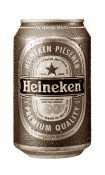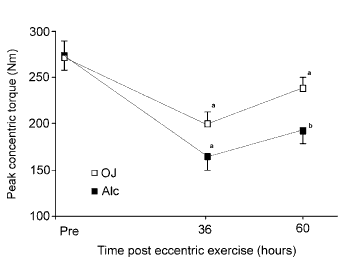If you do weight training and regularly go out on the town afterwards then you’ll already know this from your own experience, but it’s always nice to see your own wisdom confirmed by serious scientific research. Drinking alcohol after a heavy training delays your muscle strength recovery, and therefore reduces the growth stimulus of a power training session.
 |
Sports scientists at the Massey University in New Zealand studied the effect of alcohol on post-training recovery because know the sports world only too well. "Many sportspeople, particularly those involved in team-based sports, regularly ingest moderate to large volumes of alcohol (ethanol) in the hours after training or competition as a means of celebrating, socialising or bowing to sponsorship commitments."
It’s possible to study the effects of heavy training by getting test subjects to do ‘negative training’: they can lower the bar themselves, but they do the upward movement together with a spotter. This way athletes can train with weights that they wouldn’t be able to lift by themselves. The effect of drinking alcohol after this kind of eccentric training has never been studied before.
The test subjects first did three sets of one hundred reps on a leg-extension machine. The researchers encouraged the test subjects – healthy young men with an average age of 23, who did weight training and drank alcohol regularly - to exercise as much resistance as possible on the downward movement of the machine during each rep. After the training one group was given orange juice to drink and the other group was given vodka and orange. The vodka group consumed eighty grams of alcohol, the equivalent of eight glasses of wine or beer.
The graph below shows each group's recovery after the training. OJ = orange juice, ALC = alcohol group.

At three moments after the training the researchers measured the peak torque, call it maximum strength for simplicity. In the orange juice group the peak torque was 12, 28 and 19 percent lower than before the eccentric training. In the vodka group the reduction was 34, 40 and 34 percent lower.
The alcohol intake had no effect on the concentration of the enzyme creatine kinase in the blood, an indicator of muscle damage. The test subjects did not have more muscle pain either.
The researchers think that alcohol affects the nerves that stimulate the muscles to grow after a training session. They also suspect that alcohol inhibits the production of cytokines, which the immune system uses to clear up and restore damaged muscle tissue after physical exercise. Molecular scientists have a different take on the matter. They think that alcohol inhibits the attachment of energy-providing phosphorus groups to anabolic signal molecules in the muscle cells.
"Our observations suggest that participants in sports should be encouraged to avoid alcohol intake in the post-event period if optimal recovery is required", the researchers conclude.
Source: J Sci Med Sport. 2009 Feb 18. [Epub ahead of print].
Source: http://www.ergo-log.com/alcoholtraining.html


